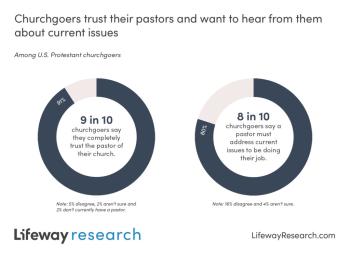Since Acts 2, the Church has been a place for like-minded Christ-followers to gather to celebrate the Lord and learn about moral, ethical, and cultural issues through a godly lens. That’s why a recent Lifeway survey should concern pastors and spiritual leaders nationwide.
Elections, schools, crime, money, and any number of moral prerogatives are addressed at the business water cooler, but Christians don’t feel as adept at finding the answers in their Bible. They want that direction to come from their pastors. Yet, based on this national study, 80% of Protestants “believe a pastor must address current issues to be doing their job,” while 16% don’t, and 4% are unsure.
Scott McConnell, executive director of Lifeway Research, noted that as the “culture increasingly includes fewer overtly Christian elements and more non-Christian ideas, churchgoers are hungry to know what the Bible says about life’s issues.”
“Churchgoers notice that most pastors are not just preaching from the Bible as a historical document,” stated McConnell. “Pastors seek to explain the original meaning and context, but then apply those principles to issues and situations today. Such application of the biblical text helps churchgoers recognize its relevance.”
It shouldn’t escape timing. This survey comes on the heels of what may become one of history’s most contested and visceral presidential elections. Perhaps this is why the faithful look to their God-given leaders for direction amid the cultural issues accompanying people to the polling booth.
In Light of Fewer Christians, the Church Wants More

Since the turn of the 21st century, church attendance has been declining—and that was before COVID. A 2023 Gallup poll cited only 20% of U.S. adults attending church weekly. Moreover, 57% of Americans are “seldom” or “never” in religious service. There are various reasons for the dwindling numbers. One that appears in many polls is the younger generation being “turned off” by high-profile church scandals and increasing vagueness delivered from the pulpit.
Subconsciously, they want direction from people they want to trust. And the Church is woefully unable to provide counsel on critical cultural issues. Churches already experience an average of 10% to 15% attrition each year, but is the lack of discussion about pressing issues related to Biblical truth causing that number to grow?
The Lifeway survey alludes to the lack of counsel churchgoers feel like they receive from the pulpit. Only 62% report that their pastors address cultural issues in sermons nearly every week, while 23% say this occurs at least once a month. Only 6% feel that such discussions happen rarely. Later in the survey, we’re told 91% of these same polled adherents express “total confidence” in their spiritual leaders.
“As American culture increasingly includes fewer overtly Christian elements and more non-Christian ideas, churchgoers are hungry to know what the Bible says about life’s issues,” McConnell says.
 With a resounding trust in a spiritual leader who is not discussing serious issues, Christians may look elsewhere for direction. Anywhere outside the Bible could result in calamitous effects for the Body of Christ. Believers want guidance, which is why they initially turn to Jesus. Then, they read James 1:5:
With a resounding trust in a spiritual leader who is not discussing serious issues, Christians may look elsewhere for direction. Anywhere outside the Bible could result in calamitous effects for the Body of Christ. Believers want guidance, which is why they initially turn to Jesus. Then, they read James 1:5:
If any of you lacks wisdom, you should ask God, who gives generously to all without finding fault, and it will be given to you.
If Christians of any age are either immature in their faith or emotions, their wisdom could be clouded or misunderstood. This underscores the need for pastors to address those confused or controversial moral, ethical, or cultural issues. Lifeway offers the following in their survey:
Churchgoers want to understand how the Bible remains relevant to the issues they regularly face. Don’t assume that because your congregation doesn’t want to hear an endorsement they also expect you to stay silent on the important events and causes of our day. They trust you and want to hear from you on how they can apply eternal biblical truth to current issues.
With many people leaving churches each week, fewer people considering attending one, and the ones in the pews overwhelmingly looking to their pastor for advice, church leaders should strive to do better and help congregants navigate the complexities of life.
The elders who are among you I exhort, I who am a fellow elder and a witness of the sufferings of Christ, and also a partaker of the glory that will be revealed: Shepherd the flock of God which is among you, serving as overseers, not by compulsion but willingly, not for dishonest gain but eagerly; nor as being lords over those entrusted to you, but being examples to the flock; and when the Chief Shepherd appears, you will receive the crown of glory that does not fade away.

